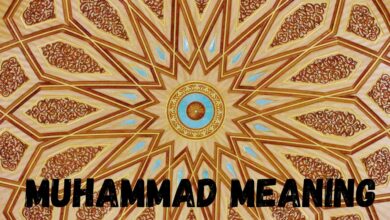Shahada Meaning | Powerful Beacon | 2023
Unlocking the Deeper Significance

Shahada Meaning
Shahada Meaning is “There is no god but Allah, and Muhammad is the messenger of Allah.” It affirms the monotheistic belief in one God (Allah) and the prophethood of Muhammad.

- SubhanAllah Meaning | Divine Praise | 2023
- Surah Kafirun | Meaning | Importance | Islamic Article | 2023
- 786 Meaning | Hidden Power of 786 | 2023
- Muhammad Meaning | Islamic Name | The Messenger of Islam | 2023
- What is Alhamdulillah Meaning in English?
Introduction
The Shahada, often translated as the Islamic declaration of faith, is a fundamental pillar of Islam. It serves as a cornerstone for the religion, encapsulating the essence of Islamic belief and devotion. In this article, we will delve deeper into the meaning of the Shahada, exploring its significance, implications, and the profound message it conveys to Muslims and non-Muslims alike.
The Shahada Meaning in Arabic
The Shahada is a concise statement in Arabic that goes as follows: “La ilaha illallah, Muhammadur rasulullah.” Translated, it means “There is no god but Allah, and Muhammad is the messenger of Allah.” This simple yet powerful declaration lies at the heart of Islam and has been recited by countless Muslims throughout history as an expression of their faith.
Monotheism at Its Core
At its core, the Shahada affirms the absolute monotheism of Islam. It boldly proclaims the belief in one and only one God, Allah. This notion is central to Islamic theology and is a fundamental distinction between Islam and other belief systems. The Shahada rejects any notion of polytheism or associating partners with Allah, emphasizing the oneness of God.
Shahada Meaning :The Oneness of God
The phrase “La ilaha illallah” emphasizes the oneness of Allah, meaning that there is no deity worthy of worship except Allah. This concept underscores the Islamic belief in the uniqueness and singularity of the Creator, who is not bound by time or space and is without partners or associates. For Muslims, this is the foundation upon which their entire belief system rests.
Submission and Surrender
The Shahada is not just a declaration of belief; it is also a commitment to submission and surrender to the will of Allah. By saying, “La ilaha illallah,” a person is acknowledging Allah’s sovereignty and their own submission to His divine guidance. This surrender is a fundamental aspect of being a Muslim, as it signifies a willingness to live in accordance with the teachings of Islam.
Muhammad: The Messenger of Allah
The second part of the Shahada, “Muhammadur rasulullah,” acknowledges the prophethood of Muhammad. This part of the declaration highlights the importance of the guidance and teachings brought by the Prophet Muhammad. He is considered the final prophet in a long line of messengers, and his role was to convey Allah’s message to humanity.
What is the Shahada Meaning?
Shahada Meaning is “There is no god but Allah, and Muhammad is the messenger of Allah.” It affirms the monotheistic belief in one God (Allah) and the prophethood of Muhammad.
What is the significance of the Shahada in Islam?
The Shahada is of paramount importance in Islam. It serves as a fundamental pillar of the faith, representing the core beliefs of monotheism and the prophethood of Muhammad. It is a declaration of one’s commitment to Islam and submission to the will of Allah.
Why is the Shahada often recited by Muslims?
Muslims recite the Shahada as an expression of their faith and as a reminder of their commitment to Islam. It is recited during prayers, conversion to Islam, and various other important life events.
How does the Shahada reflect the oneness of God in Islam?
The phrase “La ilaha illallah” in the Shahada emphasizes the oneness of Allah, rejecting any notion of polytheism or associating partners with Allah. It underscores the Islamic belief in the uniqueness and singularity of the Creator.
Who was Muhammad, and why is he mentioned in the Shahada?
Muhammad is considered the final prophet in Islam. He is mentioned in the Shahada to acknowledge his role as the messenger of Allah and to emphasize the importance of following his teachings as a guide to a righteous life.
Following the Example of the Prophet
Believing in Muhammad as the messenger of Allah also entails a commitment to follow his example. Muslims view the Prophet Muhammad as the ideal role model in all aspects of life, including morality, ethics, and spirituality. By adhering to his teachings, Muslims strive to lead a life that is pleasing to Allah.
The Shahada Meaning and Impact on Daily Life
The Shahada is not confined to a mere statement of faith; it profoundly impacts the daily lives of Muslims. It serves as a constant reminder of their purpose and responsibility as followers of Islam. It influences their decisions, actions, and interactions with others.
- Prayer (Salat): Muslims perform their daily prayers facing the Kaaba in Mecca, reinforcing their submission to Allah. The recitation of the Shahada during prayers reminds them of their unwavering faith.
- Charity (Zakat): The obligation to give to those in need is rooted in the principles of Islam. The Shahada motivates Muslims to be generous and compassionate toward their fellow human beings.
- Fasting (Sawm): During the holy month of Ramadan, Muslims fast from dawn until sunset. The Shahada reinforces their commitment to self-discipline and spiritual reflection.
- Pilgrimage (Hajj): The pilgrimage to Mecca, one of the Five Pillars of Islam, is a physical and spiritual journey. The Shahada is recited frequently during this pilgrimage, emphasizing the unity of the Muslim ummah (community).
Conclusion
In conclusion, the Shahada is far more than a mere phrase or a declaration of faith. It encapsulates the essence of Islam, affirming the monotheistic belief in one God and the prophethood of Muhammad. Beyond belief, it represents a lifelong commitment to submission to Allah’s will and living a life in accordance with Islamic principles.
The Shahada influences every aspect of a Muslim’s life, guiding their actions, decisions, and interactions. It serves as a reminder of their purpose as followers of Islam and their responsibility to seek righteousness and justice in the world.
To truly understand the Shahada is to grasp the core tenets of Islam and the profound impact it has on the lives of its adherents. It is a declaration of faith, a call to submission, and a guiding light for Muslims on their spiritual journey.
What role does the Shahada play in a Muslim’s daily life?
The Shahada influences every aspect of a Muslim’s daily life. It serves as a constant reminder of their purpose and responsibility as followers of Islam, guiding their actions, decisions, and interactions with others.
Can non-Muslims recite the Shahada?
Non-Muslims can recite the Shahada as an expression of interest in Islam or when converting to Islam. However, it is important to understand its meaning and significance before doing so.
Are there variations of the Shahada in different Islamic traditions?
While the core message remains the same, there may be slight variations in the wording of the Shahada in different Islamic traditions or languages. However, the fundamental belief in one God and the prophethood of Muhammad remains consistent.
How does the Shahada relate to the Five Pillars of Islam?
The Shahada is one of the Five Pillars of Islam, which are the five basic acts of worship and practice that are essential to a Muslim’s faith and practice. It represents the belief pillar, while the other pillars involve acts of worship, charity, fasting, and pilgrimage.
What does reciting the Shahada mean for someone converting to Islam?
For someone converting to Islam, reciting the Shahada is a profound and life-changing moment. It signifies their formal acceptance of Islam, a commitment to its beliefs and practices, and their inclusion in the Muslim community (ummah). It is a declaration of their new faith and identity as a Muslim.





